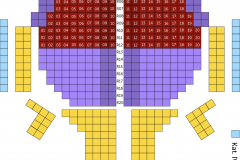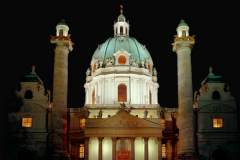Vivaldi The Four Seasons
Mo | Tu | We | Th | Fr | Sa | Su |
Admission to the concerts is permitted for children over 6 years of age and unfortunately no admission can be granted to small children under 6 years of age.
Only a few years before Vivaldi moved to Vienna, he composed his most famous “Four Seasons“, a compilation of four revolutionary concerts for solo violin and string orchestra. For poems (maybe written by Vivaldi) are the image of the composition which shows us furious thunder storms and flashes, breaking ice and twittering of birds, sleeping shepherds, barking dogs, a band of hunters....
Like many composers of the time, Vivaldi faced financial difficulties in his later years. His compositions were no longer held in such high esteem as they once had been in Venice; changing musical tastes quickly made them outmoded. In response, Vivaldi chose to sell off sizeable numbers of his manuscripts at paltry prices to finance his migration to Vienna.
The reasons for Vivaldi's departure from Venice are unclear, but it seems likely that, after the success of his meeting with Emperor Charles VI, he wished to take up the position of a composer in the imperial court. On his way to Vienna, Vivaldi may have stopped in Graz to see Anna Girò.
Vivaldi moved to Vienna probably to stage operas, especially as he took up residence near the Kärntnertortheater. Shortly after his arrival in Vienna, Charles VI died, which left the composer without any royal protection or a steady source of income. Soon afterwards, Vivaldi became impoverished[n 6][44] and died during the night of 27/28 July 1741, aged 63, of "internal infection", in a house owned by the widow of a Viennese saddlemaker.
On 28 July, Vivaldi was buried in a simple grave in a burial ground that was owned by the public hospital fund. His funeral took place at St. Stephen's Cathedral. Contrary to popular legend, the young Joseph Haydn who was in the cathedral choir at the time had nothing to do with his burial, since no music was performed on that occasion. The cost of his funeral with a 'Kleingeläut' was 19 Gulden 45 Kreuzer which was rather expensive for the lowest class of peal of bells.
Vivaldi was buried next to the Karlskirche, a baroque church in an area which is now part of the site of the TU Wien university. The house where he lived in Vienna has since been destroyed; the Hotel Sacher is built on part of the site. Memorial plaques have been placed at both locations, as well as a Vivaldi "star" in the Viennese Musikmeile and a monument at the Rooseveltplatz.
Program and cast
St Charles Church
Karlskirche (St. Charles's Church) is a baroque church located on the south side of Karlsplatz in Vienna, Austria. Widely considered the most outstanding baroque church in Vienna, as well as one of the city's greatest buildings, Karlskirche is dedicated to Saint Charles Borromeo, one of the great reformers of the sixteenth century.

 EN
EN DE
DE IT
IT FR
FR ES
ES RU
RU JP
JP RO
RO
 Seating plan
Seating plan 

